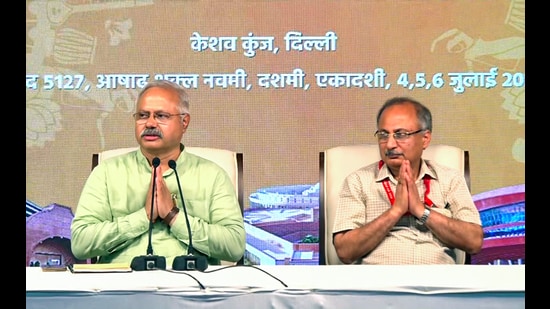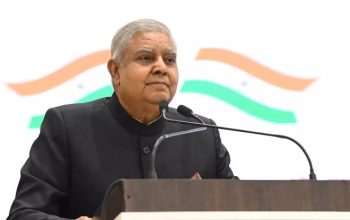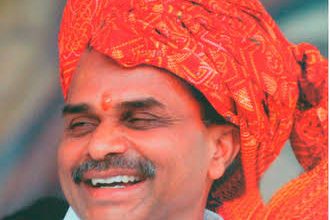NDC DESK
New Delhi: Amid ongoing protests against the perceived imposition of Hindi in non-Hindi-speaking states, the Rashtriya Swayamsevak Sangh (RSS), ideological parent of the ruling Bharatiya Janata Party (BJP), has reiterated its longstanding position that all Indian languages are national languages and that education should be conducted in the mother tongue.
Speaking to the media on Monday, RSS chief spokesperson Sunil Ambekar stated, “The Sangh has always believed that all Indian languages are national languages, and that education must be imparted in one’s mother tongue. This principle is already well-established within the organization.”
His comments come in the wake of backlash from opposition-ruled states such as Tamil Nadu and Karnataka, which have accused the Centre of pushing Hindi through administrative policies and educational directives. In Maharashtra, a state government circular mandating Hindi as a third language in primary schools was recently withdrawn following public outcry. Over the weekend, political rivals Raj Thackeray and Uddhav Thackeray briefly united to criticize the BJP-led Mahayuti government over the issue.
The RSS has consistently advocated for the use of mother tongues in education, a view echoed in the National Education Policy (NEP) 2020, which recommends that students be taught in their mother tongue or regional language at least until Class 5.
Ambekar’s briefing followed the RSS’s three-day annual All India Pracharak meeting, which was attended by senior leadership including RSS chief Mohan Bhagwat. The meeting focused on organizational matters and planning for the centenary celebrations set to commence during this year’s Vijaydashami festival.
Among the key issues discussed was the ongoing ethnic conflict in Manipur. “The current situation in Manipur was deliberated upon, including the work being done by RSS volunteers to promote social harmony,” Ambekar said. While noting that the situation remains tense, he expressed optimism. “There are signs of positive developments. Compared to last year, there is a gradual return to normalcy. This is the beginning of peace.”
The northeastern state has been under President’s Rule following prolonged clashes between the Meitei and Kuki communities, which have resulted in hundreds of deaths and the displacement of thousands. Last year, RSS general secretary Dattatreya Hosabale described the violence as “painful” and emphasized the importance of resolving conflicts through dialogue and mutual understanding.
The gathering of over 300 RSS functionaries also reviewed India’s recent military response to the Pahalgam terror attack, dubbed Operation Sindoor, which reportedly targeted terror camps and installations across the border. The RSS endorsed the government’s approach of categorizing terror attacks as acts of war and reiterated its call for a tougher internal security framework.
Additionally, the RSS voiced concern over attacks on Hindu temples abroad—in countries including Canada, the United States, and Bangladesh—and emphasized the need for stronger diplomatic engagement on religious safety.
A senior RSS member, speaking on condition of anonymity, also underscored the organization’s push for stricter immigration controls. “Illegal immigration in several border states is a serious threat to national security and demographic balance,” the official said, advocating for the implementation of a national citizen’s register to curb unlawful entries. “Other nations like the U.S. are taking firm steps. Bharat must address this issue with similar urgency.”
Looking ahead to its centenary year, the RSS is planning a massive outreach campaign aimed at strengthening its connect with the public. Ambekar announced that Hindu conferences will be held at 1.3 lakh locations across the country. Volunteers will also conduct door-to-door campaigns to engage people from diverse social, professional, and ideological backgrounds.




